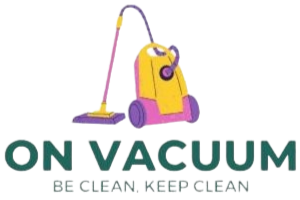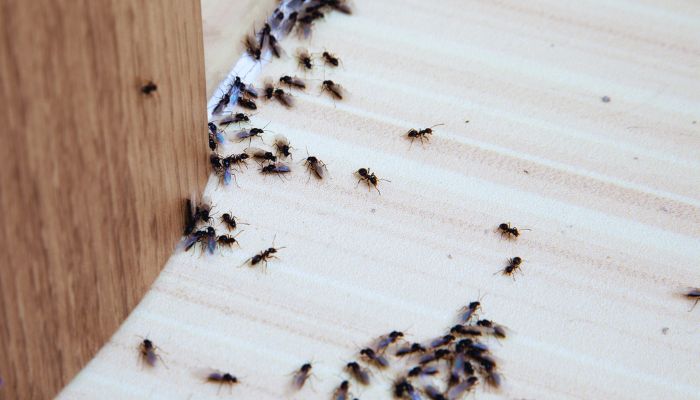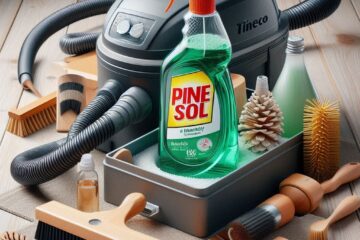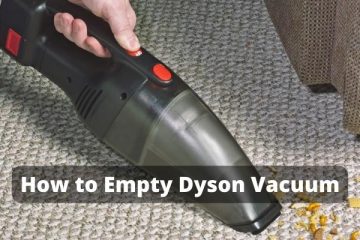Imagine this: You wake up one morning, head to the kitchen for your first cup of coffee, and there they are—a line of ants marching across your countertop. It’s a sight many of us are all too familiar with. Ants, those tiny, industrious creatures that seem to find their way into our homes no matter how clean we keep them. They’re not just a nuisance; they’re a testament to nature’s persistence. This article isn’t just about the annoyance of finding ants in your sugar bowl; it’s a guide to understanding why they’ve chosen your home and how you can kindly show them the door. We’ll explore a variety of methods, from natural remedies to more assertive tactics, ensuring that you can enjoy your space without these unwelcome guests.
Unwelcome Guests: Identifying Your Ant Adversaries
But before we declare war on all ants, it’s essential to know who we’re dealing with. Not all ants are created equal, and the species invading your home could dictate the strategy you use to remove them. For example, the odorous house ant, which gives off a rotten coconut smell when crushed, is attracted to moisture and sweets. On the other hand, carpenter ants, which are larger and more destructive, are drawn to wood and can cause structural damage. Quick identification tips include observing the size, color, and behavior of the ants. Are they trailing to a food source? Do they have a preference for sweets or proteins? Answering these questions can lead you to the most effective solution, tailored to your tiny invaders. By the end of this article, you’ll be equipped with the knowledge to identify, outsmart, and eliminate the ants in your home.
The Natural Approach: Eco-Friendly Solutions to Ant Infestations
When it comes to ant control, the eco-friendly route is not only kind to the planet but also to your home environment. Many homeowners are turning to natural solutions that are safe for both children and pets. One such remedy is the borax and sugar solution, a sweet trap that lures ants with its sugary scent and then eliminates them with the borax’s toxic properties. This mixture can be made by combining equal parts of borax and sugar with just enough water to get it syrupy. Place this concoction on a flat surface near the ant trail and watch as it becomes an irresistible, yet fatal, feast for the ants.
Essential oils are another weapon in nature’s arsenal against ants. These potent liquids are extracted from plants and have been used for centuries for their medicinal and therapeutic properties. In the case of ants, oils such as peppermint, tea tree, and lemon not only disrupt their scent trails but also act as natural deterrents. A few drops placed at entry points or along the perimeter of your home can create an invisible barrier that ants are reluctant to cross.
Diatomaceous earth, the fossilized remains of tiny aquatic organisms called diatoms, is a fine powder that’s harmless to humans but deadly to insects. Its microscopic sharp edges cut through the exoskeletons of ants, causing them to dehydrate and die. Sprinkling diatomaceous earth around ant entry points or in gardens can provide a long-lasting, non-toxic defense against these persistent invaders.
The Convenience of Commercial Products: Finding the Right Ant Baits and Traps
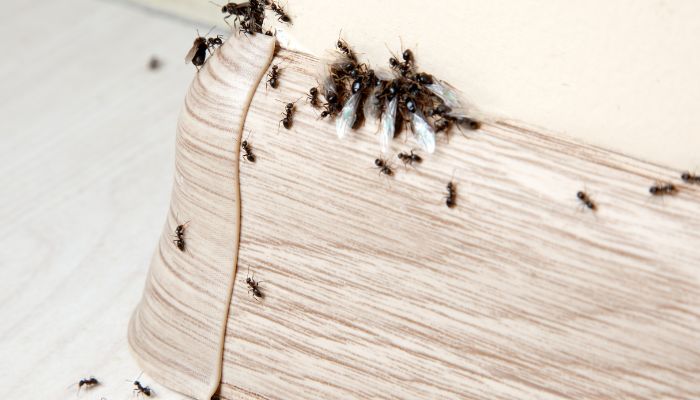
For those seeking a more straightforward approach, the market is filled with commercial ant baits and traps that promise ease of use and effectiveness. Among the most recommended products is Terro Liquid Ant Baits. These pre-filled bait stations contain a liquid bait that attracts ants with its sweet substance, which they then carry back to their colony, effectively taking out the entire infestation at its source.
Advion Ant Gel is another popular choice for homeowners battling ant invasions. This gel bait can be applied discreetly in cracks and crevices where ants are known to enter the home. Its non-repellent formula ensures that ants pass through the gel, consume it, and return to their nest, where the poison spreads, reducing the population over time.
Both these products have garnered positive feedback for their ability to tackle ant problems with minimal effort. Whether you choose a natural remedy or a commercial product, the key is to use them strategically and patiently for the best results in keeping your home ant-free.
Prevention is Key: Long-Term Strategies to Keep Ants at Bay
The best way to deal with ants is to prevent them from entering your home in the first place. This proactive approach requires a combination of vigilance and regular maintenance. Start by inspecting your home for potential entry points. Ants can enter through the tiniest of cracks, so it’s essential to seal these gaps with caulk or another appropriate sealant. Pay special attention to areas where utility pipes enter the house, as these are often overlooked highways for ant traffic.
Maintaining cleanliness is another cornerstone of ant prevention. Ants are attracted to food and moisture, so keeping your kitchen and dining areas free of crumbs and spills can greatly reduce the likelihood of an ant invasion. Regularly wipe down surfaces, sweep floors, and store food in airtight containers. Don’t forget about pet food, which should be kept in sealed containers and not left out overnight.
Your outdoor space can also play a role in ant prevention. Keep your garden tidy and free of debris where ants can nest. Trim back any tree branches or shrubbery that touch your home, as these can provide a bridge for ants to enter. Additionally, manage compost piles and ensure garbage bins are sealed to avoid attracting ants.
When to Call the Cavalry: Seeking Professional Pest Control
Despite your best efforts, some ant infestations may prove too challenging to handle alone. If you’ve tried multiple methods and the ants persist, it might be time to call in professional pest control. Signs that professional help is needed include large numbers of ants, especially carpenter ants which can cause structural damage, or if you find ants in hard-to-reach places like inside walls or under floors. Pest control professionals can identify the species of ant, locate the nest, and use more potent treatments to deal with the infestation effectively. Remember, there’s no shame in seeking help; sometimes, the expertise of a professional is the quickest path to an ant-free home.
Final Thoughts
As we reach the end of our journey through the world of ant control, it’s important to reflect on the key strategies we’ve discussed. From identifying the type of ants invading your space to deploying a range of natural and commercial remedies, we’ve covered a comprehensive battle plan. But the fight against ants doesn’t end with a single victory; it requires ongoing vigilance and maintenance. Consistency in applying the methods you’ve learned here, coupled with patience, will ensure that your home remains an ant-free zone. Remember, the goal isn’t just to eliminate the current invaders but to establish a long-term defense that keeps them from returning. With the tools and knowledge you now possess, you’re well-equipped to maintain a peaceful coexistence with nature—outside your home.
FAQs
In the quest to keep our homes ant-free, questions often arise. Here are answers to some of the most common queries:
What’s the most effective natural remedy to get rid of ants?
While several natural remedies can be effective, the borax and sugar solution is often cited as a particularly potent option. It’s easy to make and can deal with ants efficiently.
Can I use essential oils around my pets?
Yes, most essential oils are safe to use around pets, but it’s always best to consult with a veterinarian and use oils in moderation.
How often should I reapply diatomaceous earth?
Diatomaceous earth should be reapplied after any significant cleaning or if it gets wet. It’s most effective when dry and undisturbed.
Are commercial ant baits safe to use around children?
Many commercial ant baits are designed to be safe around children, but it’s crucial to follow the manufacturer’s instructions and place them out of reach.
What should I do if I can’t control the ant problem on my own?
If home remedies and commercial products don’t work, it’s time to call professional pest control. They can provide a more targeted and potent treatment to eliminate the infestation.
Learn More visit our website onvacuum
